It’s winter, so no big surprise: Your child starts to develop dry, itchy, red patches of skin.
But wait: It might not be winter dryness.
“It’s true that eczema or dry, itchy skin can be common with environmental changes like winter,” said Dr. Morgan Thakore, a dermatologist with Augusta University Health. “But psoriasis is another type of rash in kids and adults that is more common than we might think.”
Sorting Out Psoriasis
People with psoriasis oftentimes experience a thick, scaly, itchy rash that typically shows up on the elbows, knees, the lower back and around the belly button or scalp. It can also appear on the hands and feet, sometimes making it hurt to pick up things or to walk.
It’s not caused by dry air like eczema can be. It’s actually considered a form of an autoimmune disease, where the skin starts to make too many cells. When these skin cells start to build up, they turn into scaly spots that can itch, burn and turn red. People with psoriasis can also have other, non-skin symptoms, like joint pain or abnormal nails.
There are many reasons why this can happen, but “in children, it’s most commonly triggered by a preceding strep throat infection,” said Thakore. There can be a genetic component as well so if you or someone in your family has psoriasis, there’s also a good chance your child could have it too.
Moisturizers, bath oils or other at-home remedies don’t typically help much with psoriasis. So if your child has a rash that lasts for several weeks, combined with pain and itching, and possibly abnormal nails, it’s time to make an appointment with a dermatologist.
“The good news,” said Thakore, “is if you’re going to have psoriasis, now’s a good time to have it. That’s because newer treatments for the vast majority will clear it up completely or almost completely.”
These treatments include biologics, a special kind of drug that targets specific parts of the body’s immune system. It’s an injectable medication, which means the patient would need to get a shot. That may need to happen every two weeks or every three months, depending on the type of biologic they are on. “It works by lowering the markers in the blood that are high when you have psoriasis,” said Thakore.
They’re safe and effective, but kids (and adults) will need to stay on the medicine to help keep their skin clear. “Sunlight also helps,” said Thakore. “There are several prescription creams and a few oral medications that can help as well.”
Facing Psoriasis
The hardest part of having psoriasis can be how it changes the look of the skin.
People might stare, kids might say, “Yuck!” or make fun, and some might be scared it’s contagious.
“There are definitely a lot of psycho-social concerns,” said Thakore. “Whether it’s spots on the skin or excessive dandruff in the scalp, the biggest stressor can be ones of appearance, but treatment can help fix that.
“So if you’re seeking treatment, even if you’ve had psoriasis for years, know that there are safe, effective options out there and to seek assistance from a board-certified dermatologist.”




